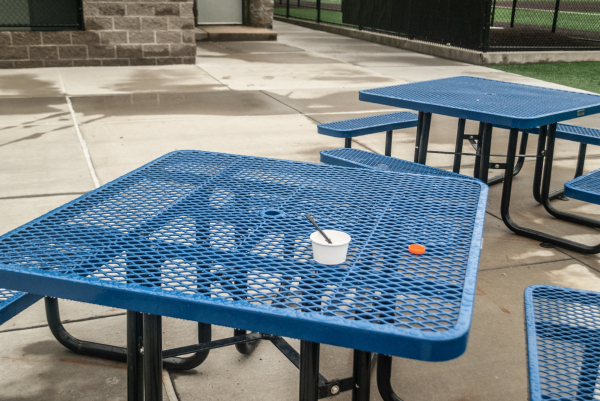Colleges Go Test Optional
With an unprecedented amount of schools going test optional, how will this affect Poly’s students?

The COVID-19 pandemic has led to nationwide closures of college campuses and cancellations of on-campus activities. This means that juniors beginning the college process are in an uncomfortable situation. In light of the current circumstances, many colleges have gone test-optional and are altering their application requirements. These decisions will likely have a long-term impact on the college process.
This sudden change has left many juniors in a place of uncertainty. The spring of junior year is an essential time for students to look at schools they are interested in. With the cancellation of tours and information sessions due to the pandemic, many students who were planning on looking at colleges for the first time over spring break are facing a major dilemma.
While colleges have made virtual resources available for prospective students, virtually navigating campuses and attending Zoom information sessions are weak substitutes for walking on campuses, meeting professors, tour guides, and other students.
Junior Talia Marash said, “There is only so much a student can go by in making a monumental decision, which will make the college process that much harder.”
Even the Brooklyn-Staten Island College Fair, an annual pilgrimage of Poly juniors, has been canceled, further limiting opportunities for Poly’s juniors to interact directly with colleges and find schools they like. Attempts to create an online BKSI fair in conjunction with other high schools have failed. However, Poly is launching the Poly College Series, allowing students to interact with college representatives in Q & As and group information sessions over Zoom.
Upper School Dean Alexis Perez said, “We hope it will give students the opportunity to meet and connect with college reps both from schools they are already interested in and from schools they would like to learn more about.
Additionally, many juniors are facing the obstacle of standardized testing. The ban on large gatherings and widespread school closures has made the administration of standardized tests impossible. Some juniors have not taken the SAT or ACT yet, and many others are looking to improve their scores by taking the exam again and super scoring. With early decision application deadlines looming, many juniors fear that if closures continue, they won’t be able to take either exam or they won’t have enough opportunities to reach an ideal score.
Junior Dominique Porte said, I feel very stressed about the fact that I may not have the opportunity to take an SAT and turn in my score. It’s also upsetting because I’ve dedicated so much time to studying for it and I may not have the chance to show my dedication.”
In response to this issue, many colleges have gone test-optional, meaning that students will not have to submit a standardized test score with their application to be considered for admission to a school. Even University of California schools, for which the SAT was specifically designed, have announced they are going test-optional. The UC schools account for hundreds of thousands of applications annually, making their decision a major turning point in the college admissions process.
Upper School Dean Nat Smitobol said, “If the UC schools figure out how to make good decisions without the SAT, it could lead to a huge change in the college process.”
Junior Sebastian Stafford said, “As someone who’s test scores don’t necessarily match up with my actual academic potential and level, I’m not actually too bothered by a lot of schools going test-optional. I think that in a lot of ways the methods of standardized tests are sort of archaic… it’s definitely revolved a lot around money and privilege as those who can afford to essentially throw money at a private tutor or college advisor end up getting vastly better scores.”
Although standardized tests are the benchmark on which colleges have always heavily relied upon when making an admissions decision, this pandemic may force colleges to develop new strategies.
Perez said, “My hope is that the pandemic will force colleges and universities to re-examine their current business practices and that the result is a more ethical and equitable process for all applicants.”
However, students must be warned that college’s decision to go test-optional may not be as well-intentioned as some may believe. Colleges have a bond rating, a measure of financial strength that is important to the business of college. Bond ratings are based mainly on the strength of average standardized test scores, so colleges will likely still be looking to accept students that already have a high test score.
Although going test-optional can be beneficial for many students, the real reason why many schools have made this choice is to maintain their pool of applicants and their low acceptance rates. Essentially, colleges fear that if they don’t go test-optional, then juniors who haven’t taken standardized tests won’t apply, leading to plummeting applicant numbers and higher acceptance rates, reducing selectivity.
Perez said, “The US Deans want to remind 11th graders and their families that schools going test-optional is mainly to benefit the schools themselves – not the students applying. This wave of test-optional adoption should not distract students from the testing plans that were already in motion.”
The uncertainty surrounding standardized testing means that it is likely that more pressure will be placed on applicants’ grades and course rigor. This means that those who may not have performed as well as they would have liked in school but have been preparing for the SAT or ACT have a definite disadvantage. Additionally, it is possible that early decision applications will play an even more pivotal role in college admissions as schools, in an attempt to recoup financial losses, scramble to enroll a full class.
Also, there are a lot of worries about the financial outlook of some small colleges. Smitobol says, “I’m worried that a lot of small schools that are incredibly strong do not have the endowment to remain open, and I fear that some colleges cannot survive this in the long term.”
The poor financial outlook of many colleges may impact students seeking financial aid. There are worries that colleges will not be able to meet demonstrated need, and it is possible that schools will look to enroll students who can pay full tuition. However, in a cruel twist, the pandemic has impacted the financial situations of many families, meaning fewer students will be able to afford full tuition.
Junior Talia Marash said, “Financially schools are going to struggle to get students who can pay as well as students who are confident in their choice of school without these physical visits… The long term implications [for the college process] will be beyond our current understanding.”

Elizabeth Bentsianov ‘21 is one of the Editors-in-Chief for Polygon this year. She began writing as a staff writer during her freshman year, became the...



























